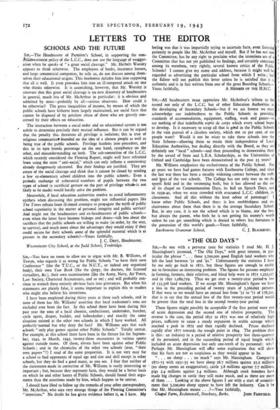SCHOOLS AND THE FUTURE
LETTERS TO THE EDITOR
SIR,—The Headmaster of Parmiter's School, in supporting the non- i.tllaborationist policy of the L.C.C., does not use the language of exagger- ation when he speaks of " a great social cleavage." Mr. Herbeit Worsley appears to think otherwise. The employees of banks, insurance houses, and large commercial companies, he tells us, do not discuss among them- selves their educational origins. This bonhomie deludes him into supposing that all is well. It even provokes him into an ill-tempered attack on one who thinks otherwise. It is astonishing, however, that Mr. Worsley is unaware that this great social cleavage is no new discovery of headmasters in general, much less of Mr. McArthur in particular: it is obvious and admitted by most—probably by all—serious observers. How could it be otherwise? The gross inequalities of income, by means of which the public schools have hitherto been largely maintained, are social facts that cannot be disposed of by petulant abuse of those who are gravely con- cerned by their effects on education.
The interaction between a social order and an educational system is too subtle to determine precisely their mutual influence. But it can be argued that the penalty that. threatens all privilege is isolation; this is true of religious communitiet founded on the idea of a chosen people as well as being true of the public schools. Privilege hardens into precedent, and this in its turn breeds patronage on the one hand, sycophancy on the other, and misunderstanding on both. The sub-committee of the L.C.C. which recently considered the Fleming Report, might well have refrained from using the term " anti-social," which can only inflame a controversy already dangerously ulcerated. But their findngs are justified. They are aware of the social cleavage and think that it cannot be closed by sending a few ex-elementary school children into the public schools.. Even a periodic exchange of substantial numbers of pupils between the two types of school (a sacrificial gesture on the part of privilege whiali-is not likely to be made) would hardly solve the problem.
Meanwhile, if local education authorities resolve to avoid inflammatory epithets when discussing this problem, might not influential papers like The Times refrain from ill-timed attempts to propagate the myth of public school superiority in the matter of personal integrity and public service? And might not the headmasters and ex-headmasters of public schools— even when the latter have become bishops and deans—talk less about the sacrifices that the public schools are willing to make (in order, by the way, to survive), and much more about the advantages they would enjoy if they could secure for their schools some of the splendid material which is at present in the secondary schools?—Yours faithfully,


























 Previous page
Previous page